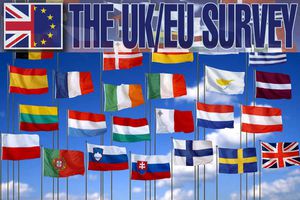The EU/UK survey - 12 questions to provide a snapshot of feelings in Shropshire
How do you feel? European? British? English? Welsh? Salopian? As our country goes through a period of transition, the Shropshire Star today launches a survey on identity and attitudes both towards the United Kingdom and Europe.

We have created 12 questions that will provide a snapshot of how our region feels towards the European Union – and whether we are happy to allow Scotland more independence.
We will see a EU referendum before the next General Election – and although polls suggest people will vote to stay within Europe, it is a close call.

Six questions on the UK:

Six questions on Europe:
The rise of Ukip in the May election shows that there is a stirring of discontent about our role in Europe and issues like the arrival of economic migrants to take British jobs and, controversially, claim our benefits.
The party may only have returned one MP, but its share of the vote rose significantly during the election campaign.
David Cameron has vowed to deliver real reform of the European Union and met with fellow EU leaders last week for the first time since his General Election victory.
The prime minister knows that he must win real concessions to keep members of his own party happy.
They include North Shropshire MP Owen Paterson, who today tells the Shropshire Star why there is no need to be scared of an exit from Europe.
On the flip side, many businesses in Shropshire and Mid Wales rely on trade with Europe – and say an exit from the EU would be devastating to them.
Mr Cameron says he is determined to give voters a "proper choice" in the in/out referendum that he is pledged to hold by the end of 2017.
He said: "It is an opportunity to start some of the discussions about the reform of the European Union.
"There will be ups and downs – you'll hear one day this is possible, the next day something else is impossible.
"But one thing throughout all of this will be constant and that is my determination to deliver for the British people a reform of the European Union so they get a proper choice in that referendum we hold – an in/out referendum before the end of 2017."
He added: "That will be constant. But there'll be lots of noise, lots of ups and downs along the way."
Today, over the next four pages, the Shropshire Star is giving you the chance to have your say on some of the issues that you will hear debated between now and that referendum – as well as the continued thorny issue of how our own United Kingdom should be made up.
The results will provide our MPs food for thought as they prepare to position themselves ahead of big decisions ahead.
Make sure you have your say on our future as a region, a country and a continent.
How do you stand on Europe? Business Editor Thom Kennedy guides you through the issues.
The matter of Britain's membership of the European Union certainly stirred the blood during the course of the General Election campaign.
It's a question of the country's right to self-determination, its control over finances, of the quality of its relationships with its nearest neighbours.
Emotions run high when discussing continued membership. There is a loud dissenting voice, led by Nigel Farage and Ukip, calling for Britain to withdraw from the continental trading bloc.
Yet at present, the broad feeling is that what people want is to remain part of the union, but with certain powers repatriated to the UK.
Bookies are offering odds of around 4/11 on Britain voting to stay within the political bloc, with an offering of closer to 2/1 behind the country choosing to quit.
Now that the polls have delivered a majority Conservative government, we can expect to be given a vote on Britain's membership by the end of 2017. So if those dissenting voices were loud before, expect the din to reach fever pitch in the next couple of years.
JCB boss Lord Bamford created a stir when he spoke out in favour of exiting the EU if it fails to reform. "We are the fifth or sixth largest economy in the world," he said as the Staffordshire-based manufacturer released its annual results last week. We could exist on our own – peacefully and sensibly."
JCB chief executive Graeme McDonald added: "I really don't think it would make a blind bit of difference to trade with Europe (if the UK left an unreformed EU). There has been far too much scaremongering about things like jobs."
It was a significant moment in the history of the debate, as Conservative donor Lord Bamford became the first owner of a big British business to talk up the prospect of a "Brexit", as Britain's potential departure has become known.
But it wasn't long before another major employer not too far from Shropshire's borders provided a significant counter-argument.
Aerospace firm Airbus, based at Broughton near Chester, warned it would reconsider investing in the UK were Britain to leave the European Union, and the company's UK president Paul Kahn said he thought it was "vital" firms took a view on a possible Brexit.
Mr Kahn said: "I believe that it is vital for a company such as Airbus to come out and make a stand in favour of Britain remaining in the European Union.
"If after an exit from the European Union economic conditions in Britain were less favourable for business than in other parts of Europe or beyond, would Airbus reconsider future investment in the United Kingdom? Yes, absolutely."
Shropshire Chamber of Commerce regularly polls local businesses as part of its Quarterly Economic Survey, and regularly asks for their views on possible withdrawal.
The most recent survey follows a pattern which has continued for more than a year, with 20 per cent saying withdrawal would be a positive move, compared with 67 per cent saying it would be negative.
However, the idea of further integration is similarly dismissed by the majority of businesses, with 52 per cent saying that would have a negative impact.
Remaining within the EU, with some powers returned to Westminster from Brussels, is by far the most popular proposal.
Just over 70 per cent of businesses surveyed believe that would be a positive step, compared with around 11 per cent saying that would have a negative impact.
Sir Mike Rake, president of the CBI, reflected that pro-European sentiment as he spoke at the organisation's annual dinner last week.
"Business has increasingly spoken out on this crucial issue and the time has come to turn up the volume," the head of the major employers' organisation said.
The CBI had taken a neutral stance when Tony Blair's government debated the merits of joining the euro in the early 2000s, as it has members on both sides of the argument.
When it comes to the country's membership, however, the organisation has taken a different stance, arguing in favour of membership in the belief that Brexit would cost jobs in the UK.
One of the key issues which came up for debate during the course of the election campaign was immigration, and during the televised leaders' debates Ukip's Nigel Farage declared his opposition to the the free movement of eastern Europeans into the UK, and said the only way to control immigration was to exit the EU.
The row over immigration, both its value and its volume, is one that is only going to become louder as we approach the referendum, particularly after new figures released on Thursday showed net-long term migration was estimated to be 318,000 in 2014.
The data showed that 641,000 immigrants came to the UK in 2014 – up by more than 100,000 from 526,000 in 2013.





